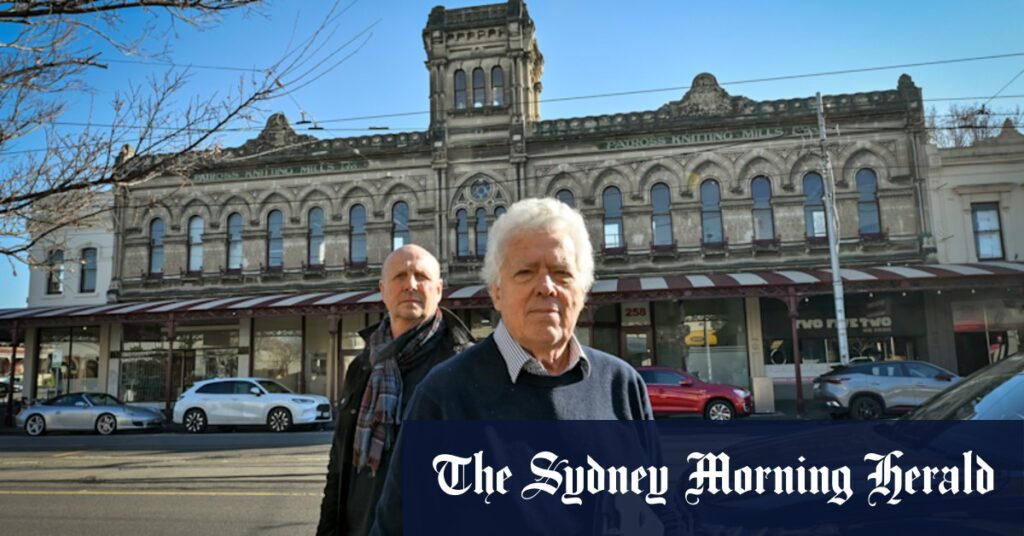“And as much as anything, we’re really upset about the process. We were completely cut out all the way through.”
Nightingale estimated his association spent about $100,000 fighting development at 219-221 Park Street, but most of this was invested in the successful VCAT case against Salta Properties’ earlier proposal for a six-storey office building.
Nightingale and Dowd at the development site, which is across the road from the Emerald Hill precinct.Credit: Eddie Jim
Dr Elizabeth Taylor, a senior lecturer in urban planning at Monash University, said this type of VCAT dispute had been around for decades, but the Allan government’s raft of planning changes meant similar appeal delays were likely to be rarer in future.
“It’s the missing middle that a lot of planners support, though it may not be perfect,” she said.
Taylor said it should be easier to build mid-rise developments like this in well-serviced inner Melbourne suburbs, although she was unsure whether curtailing resident appeal rights was the best way to achieve this.
In this case, Port Phillip City Council supported Carpe Group’s apartment plans after the developer bought the land near Clarendon Street last year and submitted a revised proposal.

An artist’s impression of Carpe Group’s proposed apartment development at 219-221 Park Street.
Alongside a pair of two-bedroom dwellings and a dozen three-bedroom apartments, the development’s ground floor will have space for an office and a shop or cafe. Basement car parking will be available.
The council did not rule on Carpe Group’s initial application within the prescribed 60-day timeframe, allowing the developer to take it to VCAT and circumvent a potentially lengthier appeal process that would have ended at the tribunal anyway.
“This does not mean that council was slow in administering the application and definitely didn’t delay the supply of housing,” Port Phillip Mayor Louise Crawford said.
“Steps in the application process, including giving public notice and seeking to mediate objectors’ concerns, mean that most major developments are not decided in the 60-day timeframe.”
The development site (left) and Emerald Hill precinct (right) over the road. South Melbourne’s public housing tower in the distance.Credit: Eddie Jim
A spokesperson for Carpe Group said the developer adapted its Park Street design to respond to South Melbourne’s heritage, the previous VCAT decision, and a meeting with residents.
“While opinions differed, we listened closely and made refinements to balance diverse perspectives,” the spokesperson said.
“This project offers 14 well-designed apartments suited to households seeking a more manageable home, while releasing larger family homes back into the market.”
YIMBY Melbourne organiser Jonathan O’Brien, who advocates for speedier development to boost housing supply and improve affordability, welcomed the medium density housing approval.
“But this demonstrates how drawn out our planning processes can become,” he said.
“Whether homes get built should not be decided in court – under a planning system less biased towards the status quo, these homes might already be under construction.”
Loading
Nightingale, meanwhile, said his association was still considering appealing VCAT’s decision.
“If I had the money, I would take them to the Supreme Court,” he said. “But, given our funds, it would be highly unlikely.”
Start the day with a summary of the day’s most important and interesting stories, analysis and insights. Sign up for our Morning Edition newsletter.
Read the full article here

